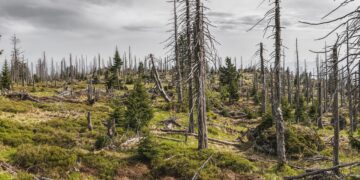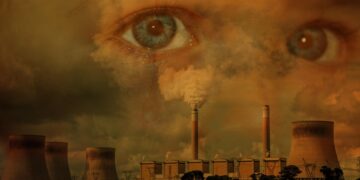The Silent Crisis: How Deforestation Is Driving Climate Change
Deforestation is a critical issue that is often overlooked when discussing climate change. While the burning of fossil fuels is a major contributor to greenhouse gas emissions, the destruction of forests also plays a significant role in driving climate change. In this article, we will explore how deforestation is impacting the environment, its connection to climate change, and what can be done to address this silent crisis.
The Impact of Deforestation on the Environment
Deforestation refers to the clearing of forests for agricultural, industrial, or urban development purposes. This practice not only destroys habitats for countless plant and animal species, but it also has a profound impact on the environment as a whole. Trees play a crucial role in maintaining the balance of ecosystems by absorbing carbon dioxide and releasing oxygen through the process of photosynthesis. When forests are cleared, this natural carbon sink is disrupted, leading to an increase in greenhouse gas emissions.
In addition to releasing carbon dioxide into the atmosphere, deforestation also contributes to soil erosion, loss of biodiversity, and disruption of water cycles. Forests act as natural filters, helping to purify air and water, regulate temperatures, and provide essential resources for local communities. When forests are destroyed, these vital ecosystem services are lost, leading to a multitude of environmental and social problems.
Deforestation and Climate Change
The connection between deforestation and climate change is clear. As forests are cleared, the carbon stored in trees is released into the atmosphere in the form of carbon dioxide. This additional greenhouse gas traps heat in the atmosphere, leading to global warming and all of its associated consequences, including rising sea levels, extreme weather events, and loss of biodiversity.
According to the United Nations Food and Agriculture Organization (FAO), deforestation is responsible for approximately 15% of global greenhouse gas emissions. This makes it one of the largest contributors to climate change, second only to the burning of fossil fuels. If deforestation continues at its current rate, the consequences for the planet could be catastrophic.
Addressing the Silent Crisis
Fortunately, there are steps that can be taken to address the silent crisis of deforestation and its role in driving climate change. One of the most effective ways to combat deforestation is through the implementation of sustainable land management practices. This includes promoting responsible forestry practices, protecting endangered species and habitats, and investing in reforestation efforts.
Another important strategy for addressing deforestation is to reduce demand for products that drive forest destruction, such as palm oil, soy, and beef. Consumers can play a crucial role in this effort by choosing products that are sustainably sourced and certified by organizations such as the Forest Stewardship Council (FSC) or the Roundtable on Sustainable Palm Oil (RSPO).
Government policies and regulations also play a crucial role in addressing deforestation. By enacting laws that protect forests, promote sustainable land use, and hold companies accountable for their environmental impact, policymakers can help to curb the destructive practices that are driving climate change.
Conclusion
Deforestation is a silent crisis that is driving climate change and threatening the health of our planet. By understanding the impact of deforestation on the environment, its connection to climate change, and the steps that can be taken to address this issue, we can work together to protect our forests and preserve the natural resources that are essential for life on Earth.
It is up to all of us to take action and make a difference. By supporting sustainable land management practices, reducing demand for products that drive deforestation, and advocating for strong government policies, we can help to protect our forests and mitigate the effects of climate change. Together, we can make a difference and ensure a sustainable future for generations to come.












